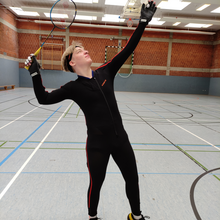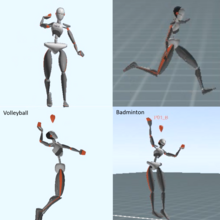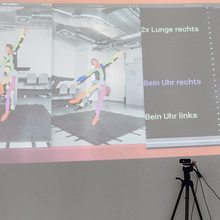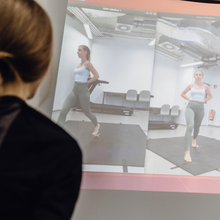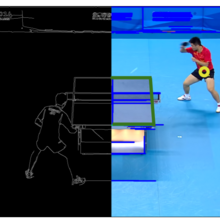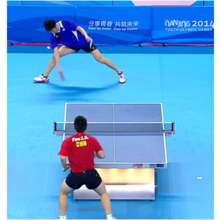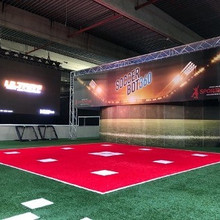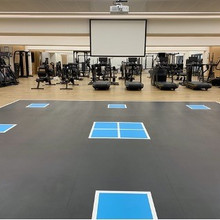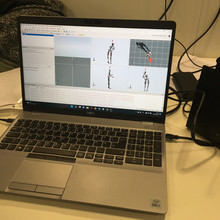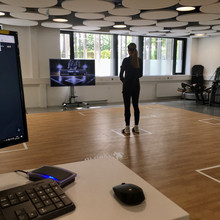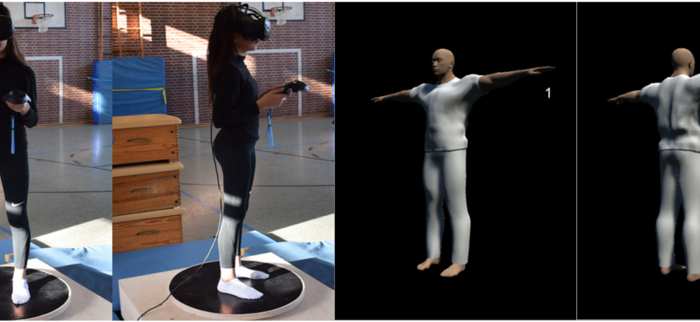Research Projects
Current Projects
Motion Capture in the Sports Games using a Full Body Suit with Integrated Sensor System
As part of the BMBF-funded project "Multimodal Immersive Learning with Artificial Intelligence for Psychomotor Skills" (MILKI-PSY), motion sequences in volleyball, handball, football, and badminton were recorded using a motion capture system (full body suit with integrated sensor system for motion capture). In volleyball and handball motion sequences with various balls were executed. In football and badminton weights were attached to participants ankles/wrists in addition to the normal motion execution. In the further course of the project, the collected motion data are to be analysed, by means of different visualisation methods, and individual body part positions are to be analysed with regard to the different research elements.
Contacts: Mai Geisen, Frowin Fasold, Florian Seifriz, Stefanie Klatt
Learning by Means of Real-Time Feedback
The BMBF-funded project "Multimodal Immersive Learning with Artificial Intelligence for Psychomotor Skills" (MILKI-PSY) aims to develop learning environments that support the learning of psychomotor skills. Here virtual worlds are combined with digital information and the real world. For this purpose, optimised movement sequences are recorded by trainers or experts with cameras and sensors. Movement models generated from these recordings offer learners a direct comparison of target and actual values. Augmented reality helps to create these immersive training environments.
Contacts: Mai Geisen, Tobias Baumgartner, Nina Riedl, Stefanie Klatt
Motor Learning through XR-Training
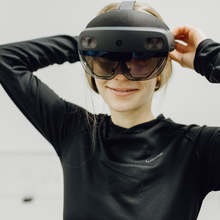
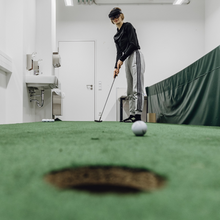
Within the scope of the BMBF-funded project "Multimodal Immersive Learning with Artificial Intelligence for Psychomotor Skills" (MILKI-PSY), an extended reality (XR) trainer was developed to support learning of the putt in golf. Learners are shown an idealised stroke execution in Microsoft HoloLens 2 Glasses so that their own stroke can be adapted more easily. A first study shows that motor learning in golf is not exclusively promoted by conventional methods, but that innovative methods also produce corresponding training effects. Future long-term studies should examine to what extent the effects of an XR trainer can go beyond the effects of conventional training.
Contacts: Mai Geisen, André Nicklas, Tobias Baumgartner, Stefanie Klatt
Visual and Tactile Feedback for Movement Optimisation in Golf
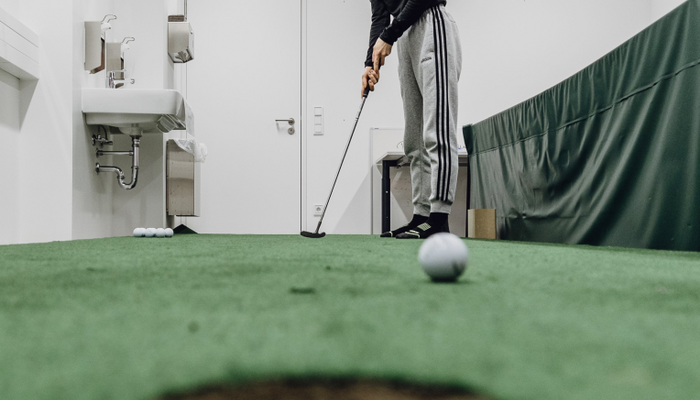
The project “XR as Training Method in Golf: Visual and Tactile Feedback for Movement Optimisation”, funded by the Federal Institute of Sport Science, aims to use technical devices to investigate the effect of tactile-visual feedback, in addition to exclusively visual feedback, during motor learning, that is, during a movement task specific to golf. For example, the wrist movement and its angular position during the execution of the pitch from a distance of 50m is investigated. The sensory feedback of the wrist movement will be provided/developed in relation to the assumed perfected wrist movement of a previously registered model. Using a training intervention, young athletes of the German Golf Association will regularly receive sensory feedback on their wrist movement over a longer period of time. The motor performance achieved at the end of the training intervention, with regard to the quality of movement execution, will be used to compare the forms of sensory feedback with each other and thus determine the relevance of tactile feedback. Since two sensory systems are involved and tactile stimuli in particular are closely linked to the sensation of motion, it is assumed that especially via tactile-visual feedback the golf swing, particularly the pitch, can be optimised quickly and efficiently and automated better in the long term. In the future, this could influence training and performance in golf.
Contacts: Mai Geisen, Timo Klein-Soetebier, Stefanie Klatt
Position Analyses in Table Tennis
For table tennis players, speed is probably the most relevant conditional skill. The game of table tennis requires quick footwork at the table as well as quick execution of the stroke movement in order to be in the right place at the right time and to execute a stroke flawlessly. In order to meet these requirements, the speed of action of table tennis players must be very pronounced. On the one hand, this involves the actual speed of movement, but also the speed of action, i.e. the ability to act quickly in the game and appropriately according to the situation. The more time the players have for the movement action in a rally, the more controlled the stroke is performed. Efficient footwork is essential for this "gain in time". It is the basis of every stroke in order to be able to stand optimally at the moment of ball contact. Therefore, analyses for footwork techniques with consideration of the stroke technique are increasingly important for players and coaches.
One concrete question that table tennis players, but also coaches and table tennis enthusiasts keep asking themselves is: "After which footwork techniques are points won or lost? Often it is no coincidence that table tennis players are uncertain about this question, because a comprehensive automated game analysis of two table tennis players with regard to winning and losing points does not yet exist in table tennis. Heatmaps are used to analyse the positions of table tennis players. The long-term goal is to develop automated analysis software for table tennis that can also be used to study efficient footwork techniques and interactions between players in the future.
Contacts: Fabiola Haas, Tobias Baumgartner, Timo Klein-Soetebier, Florian Seifriz, Stefanie Klatt
Agility and complex decision making in team sports
On average, a game athlete changes his/her movement (e.g., jumps, lateral movements, high-intensity runs, etc.) between 500-3000 times during competition at intervals of 2-4 seconds. In sports games, most of these movement changes are in response to a stimulus (e.g., another player’s movement or the ball movement). This skill is defined as agility in the current literature. The term agility encompasses perceptual and decision-making processes and takes the form of a change of speed or a change of direction (COD).
The SpeedCourt by the company Global Speed is a multifunctional diagnostic and training system. It consists of twelve contact plates and by means of the software predefined or randomized running instructions can be shown on the screen.
Based on the requirements of sports games, the SpeedCourt can serve diagnostic purposes and the purpose of training control, especially in the field of multidirectional sports. In addition, it can be used for sport-specific testing to answer cross-disciplinary research questions.
Contacts: Karsten Schul, Franz Bernhardt, Frowin Fasold, Stefanie Klatt
Digital Methodology for the Investigation of Real and Mental Rotation
In sports, especially in compositional sports, rotational movements occur frequently. Research has shown that athletes, due to their regular practice of spatial activities, have better mental rotation abilities than non-athletes. The importance of frequent real rotation and improved mental rotation in athletes can be viewed from the embodied cognition perspective, which explains that motor and cognitive processes influence each other. So far, real and mental rotation have mostly been considered separately. By means of an innovative digital methodology, research opportunities are presented that specifically enrich research regarding embodied cognition, especially in sports science.
Contacts: Mai Geisen, Stefanie Klatt
Investigation of the Significance of Character Strengths in Sports
The model of the 24 Character Strengths (Peterson & Seligman, 2004), originally developed within the field of positive psychology, has already been investigated thoroughly in many areas of life, but not in the area of sports. In the context of work and school, constant relationships between character strengths and well-being as well as performance-related parameters have been found. On the basis of first questionnaire studies, the relationships between athletes’ character strengths and their performance levels are examined in different sports. Furthermore, relationships between character strengths and the general well-being as well as sports enjoyment of youth athletes will also be investigated. Based on the findings of these preliminary studies, interventions to promote specific character strengths, well-being, and performance of athletes can be developed and tested in a next step.
In addition, a systematic literature review is conducted to review the current state of research on positive psychology interventions in sports. The goal is to determine what the typical focus of positive psychology interventions in sports has been so far and what influence such interventions have on the well-being and performance of athletes.
Contacts: Nina Riedl, Stefanie Klatt
Third Party Funding
Federal Institute of Sport Science (BISp)
2025-2026 Movement analysis of the (jump) float serve in professional (indoor and beach) volleyball players
2024-2027 Holistic training concept to improve the physical and cognitive skills of basketball referees
2022-2024 XR as Training Method in Golf: Visual and Tactile Feedback for Movement Optimisation
2021-2023 Skill and Qualification Profiles of Basketball Bundesliga Referees – General and Specific Evaluation of Physical and Cognitive Performance
2020-2021 The Influence of Gaze Behaviour in Connection with Social Interaction on the Performance of Beach Volleyball Teams
2020-2021 Elaboration of Individual Tactical Decision-Making Rules for High-Risk Shots in Golf
2019-2020 Relationship between Gaze Behaviour and Decision Making of Penalty Corner Strikers in Field Hockey
2019-2021 Analysis of Stress and Fear Reactions. Development of an Intervention Program for the Optimisation of Referee Performances in Volleyball
2018-2019 Sport-Specific Gaze Training for the Improvement of Batting Performance in Softball
2016-2017 Coordinated Gaze Behaviour in Beach Volleyball for the Improvement of the Decision Making of Elite Athletes
BMBF
2021-2024 Multimodal Immersive Learning with Artificial Intelligence for Psychomotor Skills
DFG
2018-2019 The Impact of Multimodal Perception on Decision Making in Sport
2024 - 2025 Hoops For Schools – The 360-degree school model impacting youngsters beyond the basketball court through gamification (in cooperation with FIBA)
Internal Research Funding of GSU Cologne
2021-2022 Small Otters: Children and Sport – A qualitative investigation of expert interviews regarding the teaching specifics of the respective sport with a special focus on all those aspects that go beyond the usual methods related to technique, tactics and condition (FL1)
2020-2021 Perception Training in Table Tennis – Interference- and Redundancy Effects of Visual and Acoustic Stimuli in Table Tennis (FL2)
2018-2020 The Attention Window: An Analysis of Visual Attention Control
2015-2016 The Attention Window as a Diagnostic Performance Parameter
Further funded projects
2024-2026 Activ-KV Development of the “Activate Individuals” survey tool for targeted promotion of physical inactivity by health insurers
2021-2022 The Effects of Wingwave-Coaching on the Gaze Behaviour (Society for Neurolinguistic Coaching)
2021-2022 Additional substitutions in football: Effects on player load, tactical influence, match performance, and young player development (UEFA)
2018-2019 Analysis of the Change in Heart Rate Variability of Athletes through a Special Breathing Training (Commit GmbH)
2018-2019 The Influence of the Attention Window in the Decision-Making Performance in Football (Heinrich Hertz-Foundation)
2018-2019 Investigation of the Gaze Behaviour of Referees in the Basketball Bundesliga (easyCredit Basketball Bundesliga)
2017-2023 Performance Development through Wingwave-Coaching (Society for Neurolinguistic Coaching)
2016-2019 Attention Research in the Sports Games (Ministry of Innovation, Science and Research of the State of NRW)

